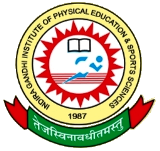Master of ARTS IN PHYSICAL EDUCATION [M.A. in Physical Education]
2 Years
M.A. in Physical Education – Indira Gandhi Institute of Physical Education and Sports Sciences (IGIPESS)
Duration:
-
2 years (4 semesters)
Objective:
The M.A. in Physical Education program at IGIPESS is designed to equip students with advanced knowledge and skills in the field of physical education, sports science, and fitness. The program aims to foster leadership in sports, enhance understanding of physical education theories, and prepare students for careers in coaching, teaching, sports management, and research.
Eligibility Criteria:
-
Educational Qualification:
-
A Bachelor’s degree in Physical Education (B.P.Ed.) or an equivalent undergraduate degree in physical education or sports science with a minimum of 50% marks (this can vary by institution).
-
-
Age Limit:
-
Candidates must be below 28 years of age at the time of admission.
-
-
Entrance Exam:
-
IGIPESS may conduct an entrance exam to evaluate candidates on their subject knowledge and understanding of physical education and sports sciences.
-
-
Physical Fitness:
-
Candidates may need to pass a physical fitness test to ensure they meet the physical standards required for the program.
-
Admission Process:
-
Written Exam:
A written entrance exam that tests general knowledge of physical education, sports science, and fitness topics. -
Physical Fitness Test:
A test to evaluate the candidate's physical capabilities. This may include fitness drills, sports skills, or agility tests. -
Interview:
An interview may be conducted to assess the candidate’s passion for sports, interest in the field of physical education, and academic background.
Course Structure:
The M.A. in Physical Education program at IGIPESS offers both theoretical and practical learning opportunities, including specialized courses and research components.
Core Subjects:
-
Sports Psychology: Understanding the mental aspects of athletes' performance.
-
Advanced Exercise Physiology: Study of how the human body responds to physical activity.
-
Biomechanics: The study of mechanical laws applied to human motion.
-
Sports Management and Administration: Covers the management of sports organizations, events, and facilities.
-
Nutrition and Health: Exploring the relationship between nutrition, health, and performance in athletes.
-
Sports Coaching and Training: Advanced techniques for coaching athletes and managing training programs.
-
Research Methodology: Developing skills in research related to physical education and sports sciences.
-
Yoga and Wellness: Techniques of integrating yoga into physical education programs.
Practical Training:
-
Internships: Students often gain hands-on experience through internships in schools, sports organizations, gyms, and fitness centers.
-
Sports Coaching: In-depth exposure to coaching techniques across various sports.
-
Event Management: Involvement in organizing sports events and tournaments.
Dissertation:
-
A research project or dissertation is typically required in the final year, allowing students to explore a specific topic of interest in physical education and sports sciences.
Career Opportunities:
Graduates of M.A. in Physical Education from IGIPESS can pursue careers in various fields related to sports, education, and fitness:
-
Physical Education Teacher: Teaching physical education in schools and colleges.
-
Sports Coach: Coaching individuals or teams in a variety of sports.
-
Sports Manager: Managing sports clubs, organizations, or events.
-
Fitness Trainer: Working as a fitness instructor or personal trainer in gyms, fitness centers, or wellness clinics.
-
Sports Administrator: Overseeing sports facilities, programs, or event management.
-
Sports Psychologist: Helping athletes improve their mental game and performance.
-
Recreation Manager: Organizing and managing recreational sports programs.
-
Sports Scientist: Researching or advising on sports-related health and performance matters.
Higher Studies:
-
M.Phil. in Physical Education: For further research in physical education and sports sciences.
-
Ph.D. in Physical Education: For a career in academic research or teaching at the university level.
-
MBA in Sports Management: For those interested in the business and management side of sports.
Why Choose M.A. in Physical Education at IGIPESS?
-
Experienced Faculty: The program offers expert guidance from experienced faculty members in the field of physical education, sports science, and coaching.
-
State-of-the-art Facilities: Students have access to world-class sports facilities and training grounds for practical learning.
-
Research and Internships: Students gain hands-on experience through research projects and internships, preparing them for real-world applications.
-
Career Opportunities: Graduates are well-equipped to pursue careers in education, sports coaching, fitness, and management sectors.
-
Holistic Learning: The combination of academic coursework, practical experience, and research helps students build a well-rounded skill set in physical education and sports.




698f0c7febeb5.png)

